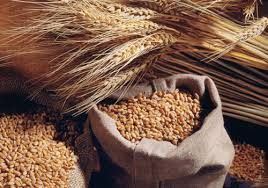
Wheat Grains
Wheat is the main cereal crop in India. The total area under the crop is about 29.8 million hectares in the country. The production of wheat in the country has increased significantly from 75.81 million MT in 2006-07 to an all time record high of 94.88 million MT in 2011-12. The productivity of wheat which was 2602 kg/hectare in 2004-05 has increased to 3140 kg/hectare in 2011-12. The major increase in the productivity of wheat has been observed in the states of Haryana, Punjab and Uttar Pradesh. Higher area coverage is reported from MP in recent years.Indian wheat is largely a soft/medium hard, medium protein, white bread wheat, somewhat similar to U.S. hard white wheat. Wheat grown in central and western India is typically hard, with high protein and high gluten content. India also produces around 1.0-1.2 million tons of durum wheat, mostly in the state of Madhya Pradesh. Most Indian durum is not marketed separately due to segregation problems in the market yards. However, some quantities are purchased by the private trade at a price premium, mainly for processing of higher value/branded products.
...more
Tamarind Seed
Tamarind is the fruit of Tamarindus indica popularly used in Indian cuisine. Roasted tamarind seeds are a popular snack amongst the rural population. Mostly available during dry season, tamarind seeds contain phosphorus, magnesium, vitamin c, potassium, calcium and amino acids. Tamarind seeds are shiny black in colour and have numerous nutritional and health benefits. Tamarind Seed Benefits: The red outer cover of the tamarind seed cures diarrhoea and dysentery effectively. Extracts of tamarind seeds contain xyloglycans, which is used in many cosmetics and pharmaceutical products. They are topically used for treating minor skin rashes. Its anti-inflammatory property eases out joint pain, especially in people suffering from arthritis. Consume ½ a teaspoon of roasted tamarind seed powder twice a day with water to boost joint lubrication which soothes pain. Tamarind seed juice is a natural remedy to cure indigestion and increase bile production. Its rich dietary fiber contains lowers cholesterol. This helps digestion and is a great natural appetizer. This is also useful to treat stomatitis and relieve constipation. Tamarind seeds contain immunity boosting properties that protect you from many diseases and disorders.
...more
Sugar
People all around the world eat sugar as part of a healthy, nutritious and balanced diet. Many people worry that eating sugar may be bad for their health. Their concern is unnecessary as extensive research has not been able to link the consumption of sugars to any chronic disease except dental caries (tooth decay). And even though dental caries has been associated with sugar consumption, there are many other factors (including the consumption of other carbohydrates and oral hygiene) that play an important role in the development of caries.
...more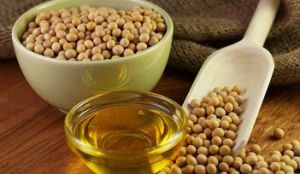
Soyabean Oil
Soybean oil is widely used oil and is commonly called "vegetable oil". Soybean oil is a very healthy food ingredient despite the bad publicity regarding fats and oils in general. Soybean oil is very popular because it is cheap, healthful and has a high smoke point. Soybean oil does not contain much saturated fat. Like all other oils from vegetable origin, soybean oil contains no cholesterol. Saturated fat and cholesterol cause heart diseases and mainly found in products from animal origin such as milk, cheese and meat products. Soybean oil contains natural antioxidants which remain in the oil even after extraction. These antioxidants help to prevent the oxidative rancidity. Benefits of Soybean Oil Perhaps the main benefits of soybean oil are for food manufacturers, who are able to use cheap vegetable oils for their products. It took many years before conventional health authorities to finally warn against using trans fat. The Food and Drug Administration (FDA) required food manufacturers to list trans fat content on the label starting January 1, 2006 – a move that essentially allows some companies to fool buyers, as any product containing up to half a gram of trans fat per serving can still legally claim to contain zero trans fat.9 It turns out that the trick is to reduce the serving size to bring it below this threshold
...more
Soyabean Meal
Soybean meal also known as Soyabean Deoiled Cakes ( DOC ) is a solid residue bi-product, created after grinding the soybean to extract soybean oil. It is widely used as a filler and source of protein in animal diets, including pig, chicken, cattle, horse, sheep, and fish feed. Soybean meal is preferably made from high quality, sound, clean, dehulled yellow beans, since beans with a dark colored seed coat, or even beans with a dark hilum will inadvertently leave undesirable dark specks in the flour. Advantages of Soyabean Meal High digestibility Excellent energy content High consistency Rich source of protein
...more
Rice Grain
Rice is the most important human food crop in the world, directly feeding more people than any other crop. In 2012, nearly half of world’s population – more than 3 billion people – relied on rice every day. It is also the staple food across Asia where around half of the world’s poorest people live and is becoming increasingly important in Africa and Latin America. Rice has also fed more people over a longer time than has any other crop. It is spectacularly diverse, both in the way it is grown and how it is used by humans. Rice is unique because it can grow in wet environments that other crops cannot survive in. Such wet environments are abundant across Asia. The domestication of rice ranks as one of the most important developments in history and now thousands of rice varieties are cultivated on every continent except Antarctica.
...more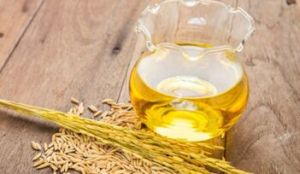
Rice Bran Oil
Rice bran oil is popular in several countries such as Japan, India, Korea, China and Indonesia as cooking oil. It has been shown that RBO is an excellent cooking and salad oil due to its high smoke point and for its delicate flavor. RBO research shows it may reduce cholesterol and cardiovascular diseases. The nutritional qualities and health effects of rice bran oil are discussed below, and are compared with other commonly used coking oils. Benefits of Rice bran oil A component of rice bran oil is the antioxidant γ-oryzanol, at around 2% of crude oil content. Thought to be a single compound when initially isolated, it is now known to be a mixture of steryl and other triterpenyl esters of ferulic acids. Also significant is the relatively high fractions of tocopherols and tocotrienols, together as vitamin E. Rice bran oil is also rich in other phytosterols. Cholesterol Menopause Antioxidant stability Skin
...more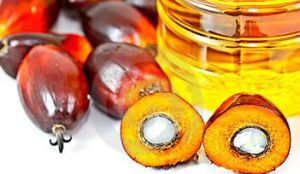
Palm Olein Oil
Palm Olein Oil (also known as dendê oil, from Portuguese) is an edible vegetable oil derived from the mesocarp (reddish pulp) of the fruit of the oil palms, primarily the African oil palm Elaeis guineensis, and to a lesser extent from the American oil palm Elaeis oleifera and the maripa palm Attalea maripa. Palm Olein Oil is naturally reddish in color because of a high beta-carotene content. It is not to be confused with palm kernel oil derived from the kernel of the same fruit, or coconut oil derived from the kernel of the coconut palm (Cocos nucifera). The differences are in color (raw palm kernel oil lacks carotenoids and is not red), and in saturated fat content: Palm mesocarp oil is 41% saturated, while palm kernel oil and coconut oil are 81% and 86% saturated respectively. Carotenoids (alpha-,beta-,and gamma-carotenes) Sterols (sitosterol, stigmasterol and campesterol) Vitamin E (tocopherols and tocotrienols) Water-soluble powerful antioxidants, phenolic acids and flavonoids
...more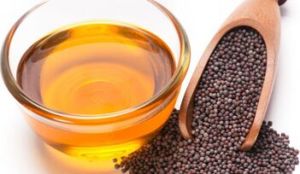
Mustard oil
Mustard oil is a fatty vegetable oil extracted from the mustard seeds. It is dark yellow in color and slightly pungent. There are generally three types of mustard oils depending upon the manner of extraction. The first is a fatty vegetable oil obtained by pressing the mustard seeds. The second one is a essential oil that is made by grinding the seeds, mixing them with water and extracting the oil through distillation. The third process involves infusing mustard seed extract with other vegetable oils such as soy bean oil. All three categories of oil have a pungent nutty taste and a strong aroma. The term mustard oil is used for two different oils that are made from mustard seeds: A fatty vegetable oil resulting from pressing the seeds, An essential oil resulting from grinding the seeds, mixing them with water, and extracting the resulting volatile oil by distillation. Benefits of Mustard Oil The health benefits of Mustard Essential Oil can be attributed to its properties as a stimulant, irritant, appetizer, antibacterial, antifungal, insect repellant, hair vitalizer, cordial, diaphoretic, antirheumatic and tonic substance. Mustard oil has had contradictory reputations in different parts of the world over the years. It is a very popular oil on the Indian Subcontinent, specifically in the Eastern parts of India and in Bangladesh. There, it is used as an edible oil and is considered very healthy, whereas in the rest of the world, it is often considered toxic, irritable and not suitable for edible purposes. In some parts of Europe, there is even a ban on selling this oil and in some other countries; it is sold as a massage oil reserved for external application only.
...more
mung
Mung beans — a type of small, green legume in the same plant family as peas and lentils — is a high source of protein, fiber, antioxidants and phytonutrients. Although in most parts of the world they’re less popular than other bean varieties, like chickpeas or black beans, mung beans have some huge health benefits to offer! While mung beans may be new to most people in the U.S, they’ve been a part of traditional Ayurvedic diets in India for thousands of years. Mung beans are considered “one of the most cherished foods” in the ancient Indian practice that’s been a traditional form of medicine since roughly 1,500 B.C.
...more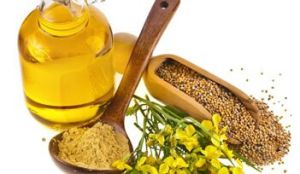
kachchi ghani mustard oil
Kachchi Ghani mustard oil is also known as raw grade and is obtained by a process of cold pressing chain of clean and sound mustard seeds of species like Brassica campestris linn (yellow or brown) brassica juncea linn (lahi, rai or laha) or brassica napus (rape or toria) or a mixture of them. Kachchi Ghani mustard oil is rich in presence of natural essential oil (allyl isothiocyanate) as it is extracted through cold pressing processes which retains the natural properties of mustard in end product and gives positive health impacts. Benefits of Kachi Ghani Mustard Oil: • Effective in stimulating excretion • Stimulates digestion by the production of bile and gastric juices • Acts like an appetizer and increases hunger. • Brings back the sensation to the organs that suffer from lack of sensation or numbness. • Acts like an insect repellent • Serves like an anti fungal agent • Stimulating effects of oil enhance blood circulation in scalp whereas the fatty acids nourish the roots of hair. it has been observed that long term use of this oil on the hair strengthens and prevents hair fall efficiently.
...more
Ground Nut Oil
Groundnut oil, also known as peanut oil or arachis oil, is a mild-tasting vegetable oil derived from peanuts. The oil is available with a strong peanut flavor and aroma, analogous to sesame oil. Benefits of Groundnut Oil Groundnut oil may also provide benefits to your heart because of its monounsaturated fatty acid content (oleic acid), which help lower your bad cholesterol levels while increasing your good cholesterol. This helps prevent cardiac-related ailments, such as coronary artery disease, heart attacks, strokes, and atherosclerosis. If used in moderation and in its unheated form, Groundnut oil can have a multitude of benefits for your health. This edible oil is a natural tonic that boosts immunity and invigorates your entire body.
...more
Cotton Seed Oil
Cottonseed oil is a cooking oil extracted from the seeds of cotton plants of various species, mainly Gossypium hirsutum and Gossypium herbaceum, that are grown for cotton fiber, animal feed, and oil. Cotton seed has a similar structure to other oilseeds such as sunflower seed, having an oil-bearing kernel surrounded by a hard outer hull; in processing, the oil is extracted from the kernel. Cottonseed oil is used for salad oil, mayonnaise, salad dressing, and similar products because of its flavor stability. Benefits of Cottonseed Oil Paras Agri health advisories promote cottonseed oil as a "healthy" alternative to tropical oils because of its high unsaturated fat levels, which, findings show, has cholesterol-lowering properties – particularly LDL cholesterol. It is also free of cholesterol and has low levels of saturated fat, both of which are promoted by mainstream media and medical advice as culprits in heart disease. Vitamin E is a potent antioxidant that plays a role in the prevention of diseases, such as Alzheimer's disease, cardiovascular disease, and prostate cancer.15 Conventional health experts advise getting vitamin E from vegetable oils like cottonseed oil, because people do not eat vitamin E-rich foods on a daily basis.16 It is also believed that vitamin E contributes to the long shelf-life of cottonseed oil.17
...more
Coriander Seeds
Coriandum sativum or coriander, also known as Chinese parsley, dhania, or cilantro, is grown extensively in southern Europe, northern Africa, and Asia. A soft, hairless plant growing up to 50 cm, it is a popular herb used extensively in cuisines world over and is also highly beneficial for health. With pale asymmetrical flowers, all the parts of the plant are used for both purposes. Health benefits and medicinal uses One of coriander seeds many medicinal uses is that they can be used for clearing colds and coughs. Coriander seeds can be boiled in water along with little pepper corns, cumin seeds, and garlic flakes to make a decoction that helps clear phlegm and nasal congestion. Oddly enough, the same concoction can be used to clear flatulence. Coriander seeds can be boiled in water to make coriander tea and mixed with honey to soothe the acidity, ease constipation, clear toxins from the body, and prevent indigestion. Its digestive benefits can be attributed to the dietary fiber found in coriander. Its antioxidant properties make it excellent for preventing free radicle damage. For the same reason, coriander seeds are beneficial to skin as helps detoxify the skin and can also be used to treat fungal infections. Coriander seeds and cumin seeds boiled in water and strained after cooling can be used as a diuretic; this decoction also cools down the body. It can also help lower LDL cholesterol and protect against colon cancer. Coriander seeds are rich in copper, magnesium, iron, potassium, manganese, and zinc. These essential minerals help in increasing red blood cell count, improving metabolism, regulating growth, enhancing sperm generation, synthesizing nucleic acids, keeping blood pressure in check, and keeping diabetes in control. Coriander is also an effective antiseptic as it contains citronelol, which helps in healing mouth ulcers. It can also be used as a remedy against bad breath. Its antibacterial property helps it fight chicken pox and reduces pain caused by the pox. Coriander seeds enhance proper endocrine secretion, relieving menstrual discomfort and pain
...more
Castor Oil
Castor oil is a vegetable oil obtained by pressing the seeds of the castor oil plant (Ricinus communis). The common name "castor oil", from which the plant gets its name, probably comes from its use as a replacement for castoreum, a perfume base made from the dried perineal glands of the beaver (castor in Latin). Castor oil is a colorless to very pale yellow liquid with a distinct taste and odor once first ingested. Its boiling point is 313 °C (595 °F) and its density is 961 kg/m3. It is a triglyceride in which approximately 90 percent of fatty acid chains are ricinoleate. Oleate and linoleates are the other significant components. Benefits of Caster Oil Castor Oil has been used both internally and externally for thousands of years due to its many wonderful health benefits. Since it can strengthen the immune system, castor oil is considered a great remedy to treat the following major illnesses and ailments: Multiple Sclerosis Parkinson's Disease Cerebral Palsy Hair loss Pain from Arthritis and Rheumatism
...more
Castor Meal
Castor meal is also variously called castor meal, castor residue, castor extract & de-oiled castor cake. Castor meal - the residue obtained from castor cake by the solvent extraction process - is one of the most versatile natural manures. It is truly an organic manure which enhances the fertility of the soil without causing any damage or decay. It is enriched with the three big elements vital and conducive to the proper growth of crops - Nitrogen, Phosphorus and Potassium. It also has traces of nutrients like Manganese, Zinc and Copper, thus making it a balanced fertiliser. Moreover, it helps to neutralise the detrimental effects of chemical fertilisers. Apart from their contribution to Nutrients , they have a number of benefits in agriculture, which none of the synthetic fertilizers or pesticides can offer. They bring in the wonderful molecules that nature has designed to help the plants flourish naturally. They provide slow and steady nourishment, stimulation, protection from soil nematodes and insects, improve yields, and quality of product like taste, flavour, amino acid composition etc.
...more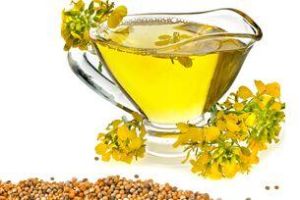
Canola Oil
Canola refers to both an edible oil (also known as canola oil) produced from the seed of any of several varieties of the Brassicaceae family of plants, and to those plants, namely a cultivar of Brassica napus L., Brassica rapa subsp. oleifera, syn. B. campestris L. or Brassica juncea. To be called canola, it must contain less than 2% erucic acid and less than 30 micromoles glucosinolates. Canola was developed through conventional plant breeding from rapeseed, an oilseed plant already used in ancient civilization as a fuel. Benefits of Canola Oil Canola oil is one of the best oils for heart health. Made from crushed canola seeds, it has less saturated fat than any other oil commonly used in the U.S. Check out the numbers: Canola oil has 7% saturated fat, compared to 12% for sunflower oil, 13% for corn oil, and 15% for olive oil.
...more
Peanut
Be first to Rate
Rate This